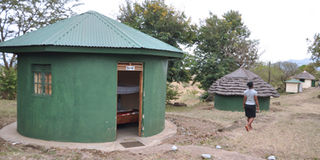UWA to terminate contracts of failed investment projects

Challenge. Bandas (self-contained huts) in Pian-Upe wildlife reserve. Most tourist areas still lack accommodation facilities. PHOTO BY ERONIE KAMUKAMA.
What you need to know:
Terminating concessions. According to Uganda Wildlife Authority contractors who have not developed awarded projects will have their concessions terminated.
Uganda Wildlife Authority (UWA) will terminate concessions of private investors who have failed to develop infrastructure around national parks, game reserves and wildlife conservation areas.
The concessions, UWA said, will be terminated over failure to fulfil contractual objectives.
The tourism sector still has limited social infrastructure such as roads, hotels and lodges and inadequate transport services.
UWA put out bids for private investors to participate in developing some of these infrastructures around tourist establishments such as the national parks and conservation areas.
However, while addressing journalists during a breakfast meeting to discuss the mandate of UWA on Tuesday, Mr Samuel John Mwandha, the UWA executive director, noted that whereas some contractors had taken up concessions to develop tourism infrastructure, many remain undeveloped years after they were awarded.
“Many concessions were awarded three years ago, but many of them have not taken up the development as it was agreed. So we are going ahead to terminate them,” he said.
Such infrastructure are significant to tourism, creating direct and indirect benefits to not only the country but to surrounding communities.
Revenue sharing programme
Mr Mwandha also noted that UWA had over the years enhanced the working relationship with communities around national parks and conservation centres by upholding the revenue sharing programme under the Wildlife Act.
The revenue sharing programme not only uplifts livelihoods but also seeks to strengthen partnerships for sustainable management of wildlife resources in protected areas.
Mr Mwandha said in April, UWA disbursed Shs4.4b to communities around Bwindi Mgahinga Conservation Area while another Shs4b was given to the communities surrounding Queen Elizabeth and Shs3b to other areas.
However, under the new Uganda Wildlife Act 2019, Mr Mwandha said, the revenue sharing programme has been designed as a conditional grant to the district, which authorities will use to uplift livelihoods as we as improving infrastructure around national parks and conservation areas.
During the meeting, Mr Mwandha also noted that they had recorded an improved growth of animals in and around national parks and game reserves, which increases Uganda opportunities to develop a well-established tourism industry.
However, he noted the growth notwithstanding, there has been a number of challenges key among them human-wildlife conflicts, encroachment, poaching and illegal trade in wildlife and wildlife products.
Other challenges, he noted, include uncooperative communities, demand for de-gazetting areas within national parks and limited infrastructure.
Uganda has 10 national parks, 12 game reserves, and five sanctuaries besides other protected areas and according to Mr Stephen Masaba, the UWA tourism director they are all active with a high number of visitors.
Mr Charles Tumwesigye, the UWA deputy director field operations, said climate change continues to pose a serious threat to tourism, noting that the snow caps on Mt Rwenzori are likely to disappear due to climatic change.
Understand the tourism cycle
Awarded concessions: About three years ago, UWA put out bids for private investors to participate in developing infrastructures around tourist establishments such as the national parks and conservation areas. However, some have not been developed three years down the road. Such concessions, UWA says, will be terminated.
Revenue sharing programme: In April, UWA disbursed Shs4.4b to communities around Bwindi Mgahinga Conservation Area while another Shs4b was given to the communities around Queen Elizabeth and Shs3b to other areas.
National parks: Uganda has 10 national parks, 12 game reserves, and five sanctuaries besides other protected areas with all receiving visitors.
Understand the tourism cycle
According to Mr Stephen Masaba, the UWA tourism director, it was important that Ugandans understand the tourism cycle so that they can take advantage of the peak season as well as plan to sustain the industry during off-peak seasons. “From July to September is the peak season for tourism. [During such periods] we receive many international tourists coming for holidays,” he said, noting that UWA has been erecting facilities alongside private investments in places such as Murchison National Park, Lake Mburo and Kidepo to supplement on already existing facilities.




